Text

#people compare bodegas to japan's lawsons as if lawsons are small business#bodegas are family run#its not corporate shill#its not sterile 7/11#its someones home
43K notes
·
View notes
Text
The first Pokémon to examine couldn't really be anything else except one of my favourites:
Skitty
Big disclaimer: I'm still learning myself. This blog is an attempt to learn something new for myself first. If anyone notices any kind of error in what's written here, even just a spelling typo, please let me know!
Learning is what we are all here for after all.
First, let's start with the Japanese name
エネコ Eneko is a pun between 狗尾草 エノコログサ Enokorogusa, which refers to the green foxtail, the type of plant that Skitty's tail looks like, and 猫 ねこ neko, cat.
Then let's look at some of the Pokedex entries:
動くものを 見つけると 夢中に なって 追いかけ回す 習性を 持つ ポケモン。
夢中(むちゅう) being absorbed in something
追いかけ回す(おいかけまわす) to chase something around
"When it sees something that moves, this Pokémon has the habit of getting immersed chasing it around"
You can attach 回す to the -masu stem of a verb to indicate that you are doing that action "all around, all over"
(Example: chasing around)
動くものを つい 追ってしまう。
"It ends up chasing moving things unintentionally"
Different dex entry, same general meaning but with a slightly different nuance. I find reading these kind of dex entries useful because they offer multiple ways of saying the same thing, and are good to reinforce the same vocabulary that appears in them and grammar rules.
ーてしまう signals that you are doing the action without meaning to
つい as an adverb similarly shows that you are doing the action unintentionally, subconsciously, and it's often paired with てしまう to emphasize it.
For its abilities, they are mostly named with English words anyway even in Japanese, except for Cute Charm (which was its only ability in Gen 3, if I remember correctly, since Normalize didn't exist)
Cute Charm is called メロメロボディ, which uses the "meromero" onomatopoeia to indicate being spellbound or madly in love.
Some interesting moves it can learn:
猫騙し (ねこだまし, Nekodamashi) Fakeout
The Fakeout move has a interesting bit of trivia in its Japanese name! It has the kanji for "cat" and "to deceive" in it, and it's actually a reference to a specific sumo move!
"Nekodamashi" refers to a sumo technique where one of the athletes slaps the air with both hands right at the beginning of the match near their opponents face to stun them. That's why it can only be used in the first turn in the Pokémon games!

And since it translates pretty much to "cat's deception", it's the reason why mostly kitty Pokémon other than Fighting types like Hariyama can use it.
真似っこ (まねっこ, Manekko) Copycat
It stands for "to imitate" and I can't help but think that the reason it can learn this move is because of another cat pun in "manekko", which conveniently also works in the english version. Sadly not in other languages.
Skitty's lost signature move:
猫の手 (ねこのて, Nekonote) Assist
Another cute move with its origin stemming from a Japanese idiom!
Assist is another move that can be learned almost exclusively by cat Pokemon, and it's effect was to randomly use a move known by another Pokémon in the party. It was unique to Skitty in Gen III and is what made it maybe my favourite Pokémon ever: watching this adorable pink kitty bust out Earthquakes and Flamethrowers that the rest of my team used was hilarious. Was it effective? Usually not, but it was hilarious.
I always had a Skitty on my team during most of my Gen III playthroughs and in ORAS.
The idiom is 猫の手も借りたい ("I want to borrow even a cat's paw), which is a way of saying "I'm desperate and need any help I can get ". Even a cat's.
Cute and fitting name for a move where a kitty asks the rest of his team for "help"!

60 notes
·
View notes
Text

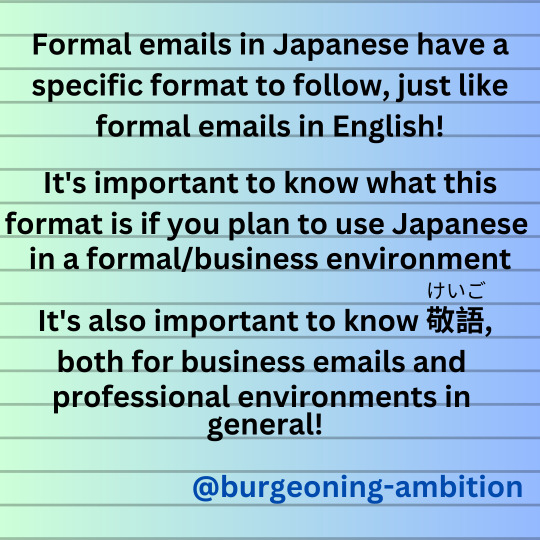
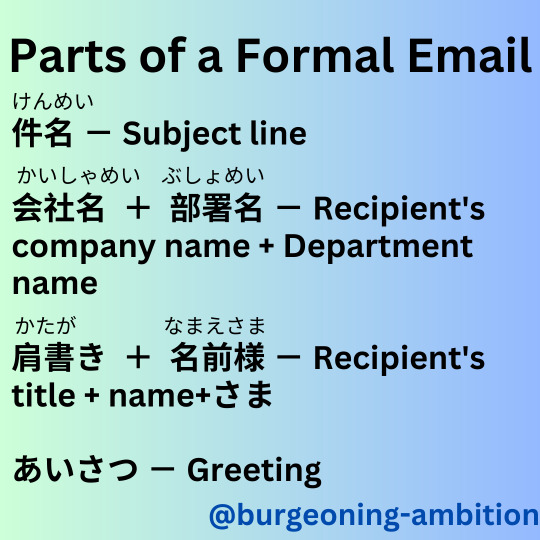

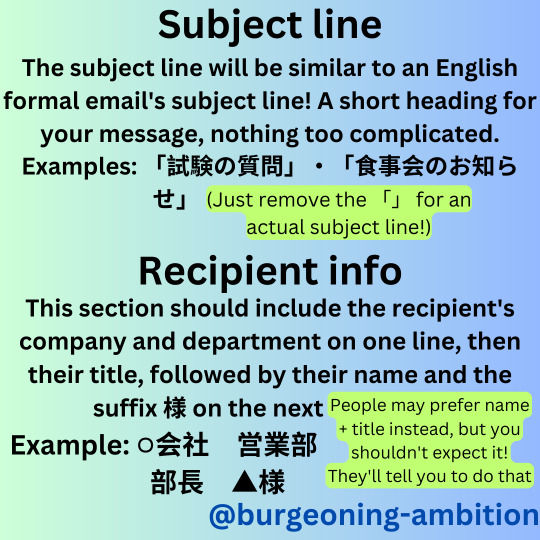

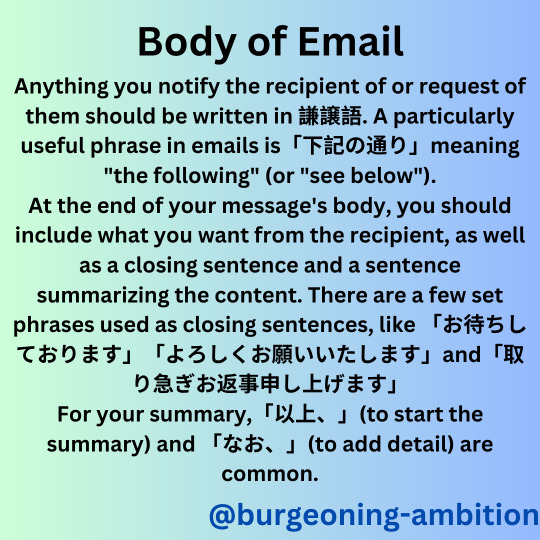
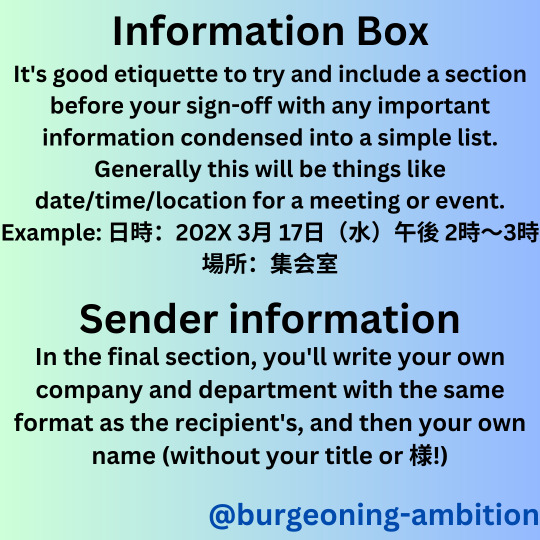
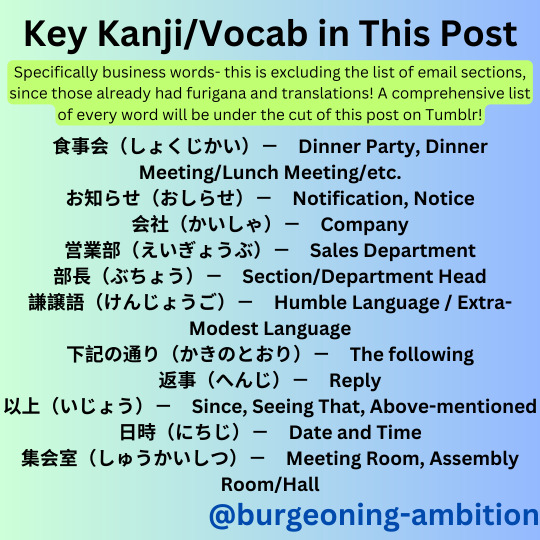

Business Japanese Review Part One: Emails!
I'm not sure how many posts I'll make about Business Japanese, but probably more than one so I say the part one is warranted, haha.
Feel free to add anything or any questions in the notes! Like I said, this isn't a fully comprehensive infographic. Also, what do people think of the lined paper style background for the title page/intro? I think they look kinda cute for the introduction, but not for the informative parts...
One thing I will add that I couldn't fit on the slides: I think some textbooks don't have super clear distinctions between 「謙譲語Ⅰ」 「謙譲語Ⅱ」 and 「ていねいご」, so I only specifically mention 謙譲語 broadly here. Parts of 謙譲語Ⅱ and ていねいご are both described as "extra-modest" in some things, for example! Just keep in mind that my post is a simplification, and if you're interested in formal language, maybe start at learning all of the different keigo categories and what they involve!
Vocab list note: The set phrases in the greetings and closings are all comparable to set phrases in English for greetings and closings of emails. I'm putting these set phrases in their entirety in the list, with a comparable English set phrase as the definition. Do not take these as equivalent phrases! They have a similar feeling, but I am not asserting that they have identical meanings. I'm just offering something comparable in case it helps a person make more sense of them!
The full vocab list + a transcript of the post is under the cut!
Vocabulary List
試験(しけん)- Exam, test
質問(しつもん)- Question
食事会(しょくじかい)- Dinner Party, Dinner Meeting/Lunch Meeting/etc.
お知らせ(おしらせ)- Notification, Notice
会社(かいしゃ)- Company
営業部(えいぎょうぶ)- Sales Department
部長(ぶちょう)- Section/Department Head
「いつもお世話になっております」 - This is a basic email greeting, similar to "Good afternoon" or "Hello, [name]" even though the meaning doesn't match at all!
「だんだん涼しくなってまいりました」 - Similar to "I hope this email finds you well"
さて - Now, Well, Then
謙譲語(けんじょうご)- Humble Language / Extra-Modest Language
下記の通り(かきのとおり)- The Following
返事(へんじ)- Reply
「お待ちしております」 - Similar to "Awaiting your reply"
「よろしくお願いいたします」 - Similar to "Thank you"
「取り急ぎお返事申し上げます」 - Similar to "Please get back to me soon"
申し上げます(もうしあげます)- To Offer, To Extend (thanks, congratulations, greetings, etc.), To Do, To State(謙譲語)
以上(いじょう)- Since, Seeing That, Above-mentioned
なお - Furthermore, In Addition
日時(にちじ)- Date and Time
午後(ごご)- PM (Time)
場所(ばしょ)- Place, Location
集会室(しゅうかいしつ)- Meeting Room, Assembly Room/Hall
723 notes
·
View notes
Text

Simple name today, and very elegant. 戸田 is read Toda.
戸 means door, and it's also the counter for houses. It can be read to or ko, and it contains the flag/corpse radical 尸.
田 means rice paddy, and it's read ta or den.
28 notes
·
View notes
Text
打ち消す
うちけす
to deny; to contradict
彼は人の言うことを頭から打ち消す。
かれ は ひと の いう こと を あたま から うちけす。
He will flat-out contradict someone's words.

52 notes
·
View notes
Text
Japanese word of the day
庭
Reading: にわ
Meaning: garden

23 notes
·
View notes
Text
Similar Japanese Words

基準 きじゅん standard; basis; criterion; norm; reference; datum
規準 きじゅん standard; basis; criterion; norm; reference; datum
These Japanese words have the same pronunciation and the same meaning. So what is the difference? In what situation should you use which word?
While they both mean "standard" the word 基準 is used much more frequently than 規準. 規準 is closer to the meaning of "norm" or a standard that is accepted worldwide. 基準 is often used in daily life and indicates a standard against which other like things are to be measured.
Just for fun there is also:
規範 きはん model; standard; pattern; norm; criterion; example
標準 ひょうじゅん standard; level; norm
While 規範 indicates a standard or norm, it's more of a literary word used in academic articles or in financial or business documents and is not used often. 標準 is also a popular business word and is used in words such as 標準化 (ひょうじゅんか) or "standardization," and 作業標準 (さぎょうひょうじゅん) or "operation standard."
So, in conclusion, 基準 is your best bet for using "standard" in most situations.
Further Reading:
What is the difference between 基準 and 規準 ?
Differences of 規範 vs 基準 vs 標準
88 notes
·
View notes
Photo
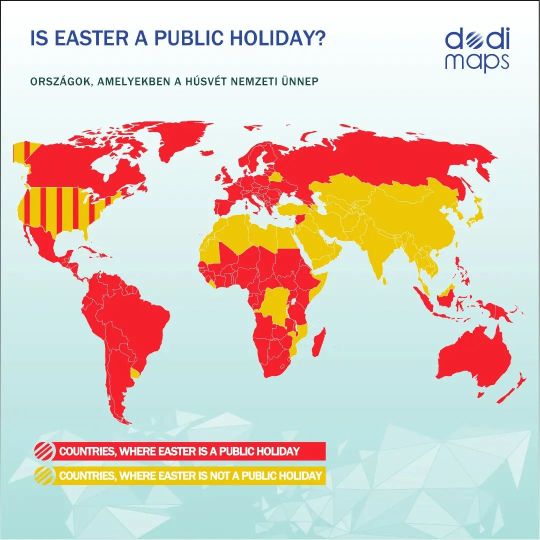
Countries where Easter (Good Friday or Easter Sunday or Easter Monday- or all of them) is a public holiday.
by dodi_maps
10K notes
·
View notes
Text
If you’re learning a language — which do you do ?
Maybe elaborate in the tags? I love knowing what people pick and why
87 notes
·
View notes
Text
四字熟語
四字熟語 (よじじゅくご) or yojijukugo are what are known as "four-character compounds" or "four-character idioms" in Japanese.
These contain four kanji, and the meanings of the individual kanji don't usually have much to do with the meaning of the idiom as a whole. But the meaning of the idiom often comes from a story which explains the derivation of the four characters used.
Like the rest of kanji, yojijukugo come from China. Yojijukugo come specifically from the Chinese Chengyu. However, there are many Japanese-only yojijukugo as well. Each yojijukugo represent the moral of a Chinese story, a Japanese proverb, Buddhist scripture, or an old Japanese story. Therefore to really understand the yojijukugo meaning, you would need to know the story behind it.
Estimates of the number of existing yojijukugo range upwards to 20,000 which is quite a lot of stories to learn. However, some are fairly straightforward and don't require a lot of information to understand the meaning. You can learn some of the most common ones without having to learn every story behind them.
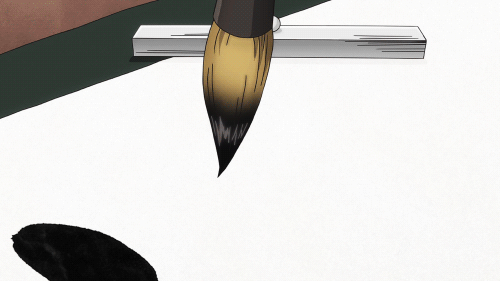
Some Common 四字熟語
一期一会 いちごいちあい
Once-in-a-lifetime encounter
一石二鳥 いっせきにちょう
Kill two birds with one stone
一生懸命 いっしょうけんめい
With utmost effort
温故知新 おんこちしん
Learning from the past
以心伝心 いしんでんしん
Without the need for words
花鳥風月 かちょうふうげつ
The beauties of nature
初志貫徹 しょしかんてつ
Achieving one's original intention
質実剛健 しつじつごうけん
Unaffected and sincere
十人十色 じゅうにんといろ
To each his own
清浄潔白 せいじょうけっぱく
Pure in heart and with a clean conscience
天真爛漫 てんしんらんまん
Simple and innocent
日進月歩 にっしんげっぽ
Steady progress
臨機応変 りんきおうへん
Playing it by ear
These are just a few of the four-compound idioms that Japanese has to offer. What is your favorite yojijukugo?
173 notes
·
View notes
Text
選手権
せんしゅけん
championship
ティラノサウルス着ぐるみのレース選手権を見に行きたい!
ティラノサウルス きぐるみ の レース せんしゅけん を みにいきたい!
I want to go watch the T-rex costume race championship!

87 notes
·
View notes
Text
Tumblrであまり使わないのに、日本語をまだ勉強す続くことだ。単語について上達しているだっと思う!
5 notes
·
View notes
Text
• 避妊 「ひにん」 - contraception
• 避難民 「ひなんみん」 - refugees, evacuees, displaced persons
• 避暑 「ひしょ」 - escaping the summer heat, going somewhere cooler during the summer, summering
• 回避 「かいひ」 - evasion, avoidance
• 退避 「たいひ」 - 1. taking refuge, evacuation 2. [computing term] (See バックアップ) backup (of data)
• 避ける 「さける / よける」 - 1. (よける only) to avoid (physical contact with) 2. (さける only) to avoid (situation) 3. to ward off, to avert 4. (よける only) to put aside, to move out of the way
• 不可避 「ふかひ」 - inevitable, inescapable, unavoidable
• 避難 「ひなん」 - taking refuge, finding shelter, evacuation, escape, seeking safe haven
• 逃避 「とうひ」 - escape, evasion, flight
21 notes
·
View notes
Text
賑わい
にぎわい
prosperity; bustle; activity; crowd; turnout
暑くなってから海岸はたいそうな賑わいだ。
あつく なって から かいがん は たいそう な にぎわい だ。
Since the hot weather set in, people have been flocking to the seaside.

25 notes
·
View notes
Text
• 切り崩す 「きりくずす」 - 1. to level (earth), to cut through (a mountain) 2. to split (the opposition), to break (strike)
• 崩落 「ほうらく」 - collapse, break, cave-in, crash, (market) decline
• 崩し書き 「くずしがき」 - cursive style of writing or calligraphy
• 雪崩 「なだれ」 - avalanche, snowslide
• 山崩れ 「やまくずれ」 - landslide
• 崩れる 「くずれる」- 1. to collapse, to crumble 2. to get out of shape, to lose one's shape, to become disorganized, to become untidy 3. to break down, to be thrown into disarray 4. to crash (stock market), to slump, to decline 5. to break money into small change 6. to turn bad (e.g. weather), to change for the worse, to deteriorate
• 崩壊 「ほうかい」 - 1. collapse, crumbling, breaking down, caving in 2. [physics term] (radioactive) decay, disintegration
34 notes
·
View notes
